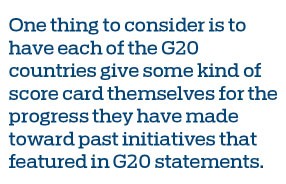Points to prove
G20 not adverse to making grand statements, but it requires actions to give it relevance
As we approach the Osaka G20 summit, a problem looms large. Namely, how effective is the G20? And what can be done to further improve its efficiency?
I have become known, at least in international business and economic circles, for coining the acronym BRIC, in light of the ongoing rise of the Brazilian, Russian, Indian and Chinese economies. In the very first paper where I mentioned the phrase, "The World Needs Better Economic BRICs", I argued that linked to their rise, as well as the beginning of the European Monetary Union on continental Europe, the world needed to shift away from the - then-dominance of G7 global governance.
By 2007, due to the global financial crisis, the G20 appeared on the scene, a much expanded group from the G7, which incorporated the four BRIC countries, as well as a number of other important so-called emerging economies. In its first 12 months of heightened importance, the G20 appeared to be an effective force, being credited after its initial late 2007 meeting, and especially after the London 2008 meeting, as ensuring that global monetary and fiscal policy would be coordinated to a degree that the fallout from the financial crisis could be managed.
Eleven years later, it is not so clear that the G20 would be able to repeat this feat or in areas outside of monetary and fiscal policy cooperation.
Let me step back further to the 1980s briefly to an era when I first started working in international finance. By 1985, years of sustained excessive dollar strength despite the widening US trade deficit led to a dramatic policy initiative from the finance leaders of the so-called G5 countries - the United States, Japan, Germany, France and the United Kingdom - at the time, the five nations that dominated world economic and financial affairs.

The infamous Plaza Accord, as it became known, was soon regarded as a major success in halting protectionist pressures in the US, although it didn't do much for the trend of the US trade balance. It certainly ended the period of dollar strength, and in subsequent years, repeated declines of the dollar were either allowed, or occasionally orchestrated by Western policymakers led by the US.
By late 1987, the G5 expanded to become the G7, with Canada and Italy added to the other five in recognition of their rise in global economic importance, and for most of the rest of the decade, the G7 countries sat at the heart of international economic, and with increasing frequency, international social and broader topics, and policymaking. With the collapse of the Soviet Union, the G8 was - temporarily - born when Russia joined the other seven countries, which certainly meant the G8 took on a regularly broader remit than mere finance and economics when the leaders held their annual meeting.
And it was more than apparent, as early as 2001, that a growing number of genuinely global economic and social challenges could not be successfully met unless some other big countries, China in particular, joined the group.
And so when President George W. Bush dragged the then little known established entity of the G20 to the forefront of global policy in late 2007, I was at the forefront of welcoming the foresight of this move. It might have, and still could, involve a lot more countries, but it was certainly a much more representative group for global governance.
It could be argued that all such international bodies frequently struggle to be effective, never mind efficient, and a realist might suggest that in practice any of these bodies are effective when their collective interests are vastly larger than their individual ones.
As it relates to the G20, certainly the scale of the 2007/8 financial crisis seemed to bring the best out of the group, with many countries happy to try to present their monetary and fiscal policy response in a collective way, which allowed observers to appreciate the massive scale of the economic policy response. However, what to do when there is no imminent crisis making headlines all over the world?
One thing to consider is to have each of the G20 countries give some kind of score card themselves for the progress they have made toward past initiatives that featured in G20 statements. It would, of course, be tricky and subject to gaming by some countries, and might - as with other ideas - suffer from the fact there is no permanent G20 staff or secretariat. One way around this would be to give that responsibility to the International Monetary Fund, which certainly on economic matters, would be relatively easy.
An example to specifically consider dates back to the South Korean-hosted G20 summit in 2010. Some countries, as well as giving the best policy response, shifted their attention to focusing on the underlying causes, and in this regard, the global balance of payments imbalances, especially between the US and China.
And there was a failed attempt to consider some kind of broad rule that when a country's current account balance went above a certain level (whether surplus or deficit) it would get called out, and result in some kind of G20 attention. This struck me as a rather good idea, but China and Germany appear to be quite opposed, not least as they regard these issues as sovereign.
In addition to asking each G20 country to record progress - or lack of - on any past initiatives, it might be an idea to really test countries, often the hosts, that want to bring a new issue on to the G20 agenda. For example, this year, it looks as though Japan is going to try to feature the issue of global governance of technology in terms of some common rules. Perhaps Japan needs to be pushed, as all other countries in the future who have ideas for new focus areas, as to precisely what they want to achieve in doing so. It is all very well to make very general grand statements, but unless anything specific occurs between and across G20 countries, what is the point?
The author is chair of Chatham House. The author contributed this article to China Watch, a think tank powered by China Daily. The views do not necessarily reflect those of China Daily.

(China Daily Global 05/28/2019 page13)


















